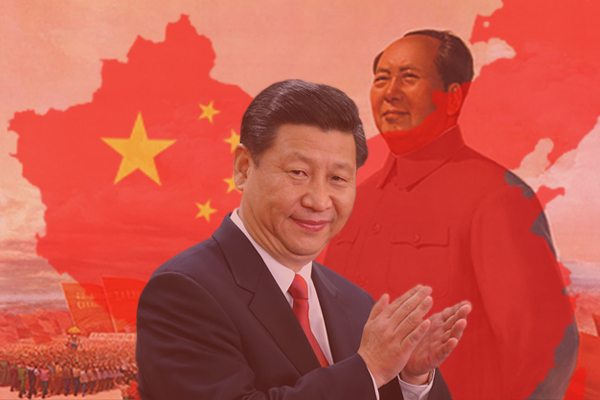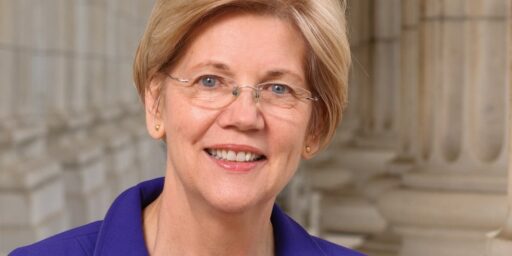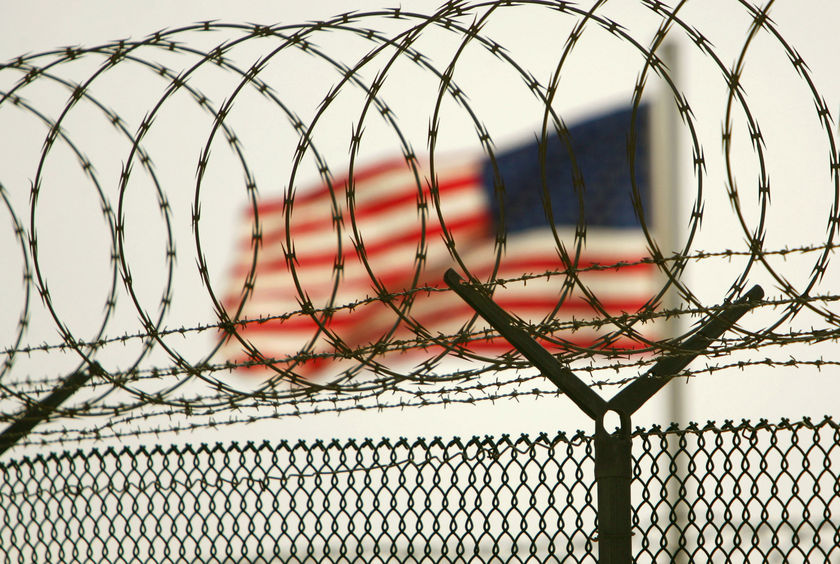China’s Demographic Genocide Against Uighers
The regime's crackdown on their Muslim minority is worse than imagined.

AP (“China forces birth control on Uighurs to suppress population“):
The Chinese government is taking draconian measures to slash birth rates among Uighurs and other minorities as part of a sweeping campaign to curb its Muslim population, even as it encourages some of the country’s Han majority to have more children.
While individual women have spoken out before about forced birth control, the practice is far more widespread and systematic than previously known, according to an AP investigation based on government statistics, state documents and interviews with 30 ex-detainees, family members and a former detention camp instructor. The campaign over the past four years in the far west region of Xinjiang is leading to what some experts are calling a form of “demographic genocide.”
The state regularly subjects minority women to pregnancy checks, and forces intrauterine devices, sterilization and even abortion on hundreds of thousands, the interviews and data show. Even while the use of IUDs and sterilization has fallen nationwide, it is rising sharply in Xinjiang.
The population control measures are backed by mass detention both as a threat and as a punishment for failure to comply. Having too many children is a major reason people are sent to detention camps, the AP found, with the parents of three or more ripped away from their families unless they can pay huge fines. Police raid homes, terrifying parents as they search for hidden children.
[…]
The result of the birth control campaign is a climate of terror around having children, as seen in interview after interview. Birth rates in the mostly Uighur regions of Hotan and Kashgar plunged by more than 60% from 2015 to 2018, the latest year available in government statistics. Across the Xinjiang region, birth rates continue to plummet, falling nearly 24% last year alone — compared to just 4.2% nationwide, statistics show.
The hundreds of millions of dollars the government pours into birth control has transformed Xinjiang from one of China’s fastest-growing regions to among its slowest in just a few years, according to new research obtained by The Associated Press in advance of publication by China scholar Adrian Zenz.
“This kind of drop is unprecedented….there’s a ruthlessness to it,” said Zenz, a leading expert in the policing of China’s minority regions. “This is part of a wider control campaign to subjugate the Uighurs.”
[…]
For decades, China had one of the most extensive systems of minority entitlements in the world, with Uighurs and others getting more points on college entrance exams, hiring quotas for government posts and laxer birth control restrictions. Under China’s now-abandoned ‘one child’ policy, the authorities had long encouraged, often forced, contraceptives, sterilization and abortion on Han Chinese. But minorities were allowed two children — three if they came from the countryside.
Under President Xi Jinping, China’s most authoritarian leader in decades, those benefits are now being rolled back. In 2014, soon after Xi visited Xinjiang, the region’s top official said it was time to implement “equal family planning policies” for all ethnicities and “reduce and stabilize birth rates.” In the following years, the government declared that instead of just one child, Han Chinese could now have two, and three in Xinjiang’s rural areas, just like minorities.
But while equal on paper, in practice Han Chinese are largely spared the abortions, sterilizations, IUD insertions and detentions for having too many children that are forced on Xinjiang’s other ethnicities, interviews and data show. Some rural Muslims, like Omirzakh, are punished even for having the three children allowed by the law.
State-backed scholars have warned for years that large rural religious families were at the root of bombings, knifings and other attacks the Xinjiang government blamed on Islamic terrorists. The growing Muslim population was a breeding ground for poverty and extremism, “heightening political risk,” according to a 2017 paper by the head of the Institute of Sociology at the Xinjiang Academy of Social Sciences. Another cited as a key obstacle the religious belief that “the fetus is a gift from God.”
Outside experts say the birth control campaign is part of a state-orchestrated assault on the Uighurs to purge them of their faith and identity and forcibly assimilate them. They’re subjected to political and religious re-education in camps and forced labor in factories, while their children are indoctrinated in orphanages. Uighurs, who are often but not always Muslim, are also tracked by a vast digital surveillance apparatus.
“The intention may not be to fully eliminate the Uighur population, but it will sharply diminish their vitality,” said Darren Byler, an expert on Uighurs at the University of Colorado. “It will make them easier to assimilate into the mainstream Chinese population.”
Some go a step further.
“It’s genocide, full stop. It’s not immediate, shocking, mass-killing on the spot type genocide, but it’s slow, painful, creeping genocide,” said Joanne Smith Finley, who works at Newcastle University in the U.K. “These are direct means of genetically reducing the Uighur population.”
Truly a monstrous policy. I encourage you to read the full report, which is chock-full of chilling anecdotes in addition to analysis.
After years of opening up under Deng Xiaoping and successors in the wake of the devastation of Mao Zedong’s reign of terror, the country has moved steadily back toward totalitarianism under Xi. Indeed, it’s difficult to argue at this point that the PRC is not fully totalitarian, exhibiting not only the institutional traits Carl Friedrich, Zbigniew Brzezinski, and Raymond Aron identified in the 1950s but also the pseudo-utopian mechanisms to remake and transform society that Karl Dietrich Bracher identified as core to the ideology. Beyond that, because of its mastery of modern technology, the CCP has means of control that Hitler, Stalin, and Mao only dreamed of.
Those of us who hoped and even assumed that China’s economic rise would inevitably rise to a strong middle class and political liberalization have, sadly, been proven mistaken. Instead, we have Xi as dictator for life running a regime that rivals Mao’s for its cruelty while, thus far at least, demonstrating Deng’s ability to maintain economic growth.






I for one am glad that the American President told Xi in no uncertain words that this injustice shall not stand…
DAMMIT…. the President said the opposite.
Nevermind. Gotz to be more careful….
China is different from Japan in that there are many more visibly distinct ethnic groups, and so the governments must be circumspect in their efforts towards racial purity. But once they had control of a group that 90% of the Chinese population views as “the other”, their true nature came out.
If the Islamic world had more cohesive international presence this would have the makings of a huge blunder. Alas, there is not enough sympathy in the tattered remnant of liberal states for a large Muslim minority to effectively speak up.
The regime’s visceral hatred of the Uighurs seems like a survival of much older political and cultural forms. It seems less like the drive to create the New Soviet Man than atavistic hatred of those other people.
I had a very left-wing acquaintance who firmly believed that China is the most humane and progressive country on the planet. Why? “Because they fed five hundred million people!” If you told him about the Uighurs, he’d dismiss it as a right-wing lie. Nothing could shake his belief in China’s goodness and benevolence.
@Kingdaddy:
Yes, that’s fair. It was always difficult to disentangle Communist ideology from the classic authoritarianisms of the country’s history, whether in Russia, China, Vietnam, or Cuba.
Still, it’s interesting that the post-Mao, pre-Xi CCP essentially ignored the Uighers—exempting them from the One Child Policy on the ground that they’re not really Chinese, so why even bother—to one that’s aiming at extinguishing them. But, again, it’s hard to disentangle Communist Party ideology and Han identity politics here.
Xi is what Trump wishes he could become.
However, it’s important to differentiate the Chinese people from the Chinese leadership–in the same way that Trump is not America, Xi is not China.
“China” isn’t doing this. Xi and his faction of the CCP are. He’s a conscienceless dictator with charisma and absolute control (thanks, in part, to purging over 1 million government officials in the name of “eliminating corruption”). It may seem like a picky detail, but it’s an important one. The blind following of the CCP has been wearing away as the population has become more middle-class and introduced to more outsiders.
This scares the shit out of the CCP–and Xi has both the skill and the heartless determination to “save them”.
He needs to be stopped.
I have long been surprised that this is not a bigger international story. I mean, seriously, there are a million people in a concentration camp somewhere right now. This should be a big deal with photos being snuck out and satellite images, etc. Am I missing these somewhere?
Even if people had not been following, when it came up as a clip in Bolton’s book that Trump said it was a good idea, we all went “f–in’ Trump again” when we should have all been saying “wait . . . what? Concentration camps?”
@Mu Yixiao:
First, don’t overread headlines. “China” is a perfectly conventional shorthand. Both my subhed and the AP’s lead make clear that it is the regime taking the action in question.
Second, though, the citizenry are always at least somewhat responsible for the actions of their government. While he wasn’t the choice of a majority of those who voted in the 2016 general election, Trump was in fact elected. It’s more complicated in the case of a Communist regime with fake elections but we routinely hold citizens indirectly liable; otherwise war and economic sanctions that inevitably harm common citizens would be unconscionable.
When the Trump adminstration locks up immigrant children in cages, America is doing that. And when the Xi regime oppresses its Uigher minority, China is doing it.
And no concept of a plan to deal with him. And that isn’t limited to Tiny.
@James Joyner:
In a world where Asian-Americans are being assaulted because of “the China Virus”, I think it’s worth reminding people that the actions of a dictator don’t reflect the views of the entire country.
But that’s not how you handle it on OTB.
Using the search term “America”, the first 5 pages of results for OTB have 2 entries in which “America” does something:
* America [is] Going Out of the Car Business
* America Hasn’t Really Noticed, But It’s Election Time In The United Kingdom
Neither of those refer to government actions.
Now type in “Trump Administration”*… Notice the difference?
OTB clearly separates “America” and “the Trump Administration” (to be fair, most of the headlines are from Doug, though Steven is good about it, too). As a veteran, a political scientist, and an experienced blogger, I would like to think that you understand the importance of separating the nation, the people living in that nation, and those controlling the government of that nation.
I lived in China for 6 years. I was there when Xi came to power, and I’ve seen what he’s done. At the smallest end, it means I can’t go back to visit my friends. It’s a fair bet that I pay more attention to what’s going on there than anyone else here (with one or two exceptions). Trump is a child with no impulse control. Xi is smart, skilled evil. He’s the Emperor Palpatine to Trumps Jar Jar Binks.
I hate to see the hundreds of good men, women, and children that I met–many of whom I consider to be friends–being painted with the same brush as Xi. Just as much as I hate knowing that my friends from all over the world are being told that “America” is doing terrible things when the fault lies on the Trump administration.
It would be simple–and more accurate–to replace “China” in these headlines with “CCP”, “Xi”, or “The Xi Administration”.
懂吗?
—
* Using just “Trump” as the search brings up too much chaff. If I could search for “Trump [verbs]” that would be great. But, alas, I can’t {melodramatic sigh}.
And who or what is going to stop him?
I don’t really know who, but Deng or someone finally realized at long last that there was no particular unbreakable relationship between market capitalism and “democracy.” Authoritarian governments do capitalism just fine–contrary to whatever Marx, Lenin, Stalin, and Mao believed. This was truly a breakthrough as it was no longer necessary to have a dysfunctional economic system in order to be a left-wing despot.
Governments will have to do moral things in order to be moral now. Just being capitalistic/democratic will no longer cut it. I wonder if Americans will get that. Or care.
@Just nutha ignint cracker:
I realize that it was a throw-away phrasing on your part, but there is no direct link between capitalism and democracy.
A wary co-existence.
—
I have been reading a lot of Chinese history lately. Things that happened centuries ago / a millennia ago are still fresh in mind.
And Uighers may live within the borders but are not seen as Chinese. And there is a sort of misguided blood honor behind the Uigher policies.
China history is fascinating. My friend is guiding me along and providing context.
@An Interested Party:
The only place it can come from is within.
And Xi’s hardline approach in a world of the rising middle class and a standard of living that was unimaginable just 30 years ago is pushing public sentiment (especially among 18-35 demographic) against Xi and the CCP. There’s a new revolution brewing in China. I don’t know how many decades it will take to reach the spark point, but if things continue the way they are, it will happen.
While Xi is extremely skilled at manipulating the government (and propaganda), he’s made one big mistake: He broke the “one country, two systems” promise with regards to Hong Kong. This is going to cause him problems in 3 ways:
1) The more that Hong Kong falls under the direct control of Beijing, the less friendly it is to foreign commerce. There’s a reason that Hong Kong has thrived in a way that Shanghai, Qingdao, and other port cities haven’t: It’s the open environment for business. Fewer companies are entering Hong Kong, and the ones that are there, are looking for somewhere else to go. That’s going to cost China billions in revenue.
2) The crackdown on Hong Kong becomes a giant spotlight shining on Xi and the broken promise from Beijing. That’s grist for the mill for “young radicals”, and weakens his position with middle-aged Chinese who aren’t sure about him. His actions say that he’s afraid of Hong Kong–that can be a major loss of face in the eyes of Chinese citizens. By being “too strong”, he appears weak.
3) Bringing Hong Kong under full control of Beijing brings all those enemies “in-house”. Instead of them being “those unruly outsiders”, they’re now “Chinese citizens who oppose the government”.
The ironic thing is that Xi Jingping could have been the next Deng Xiaoping. He could have completed his purge, then introduced “Democracy with Chinese characteristics”. The CCP wouldn’t be ousted by a popular vote (even an honest one). Their record of umpteen years of positive economic growth (no matter how manufactured) would gain them the support of the vast majority of voters. Allowing other parties to run for office would quiet the upstarts, fortify his position with the undecided, and make little to no difference in the actual power structure.